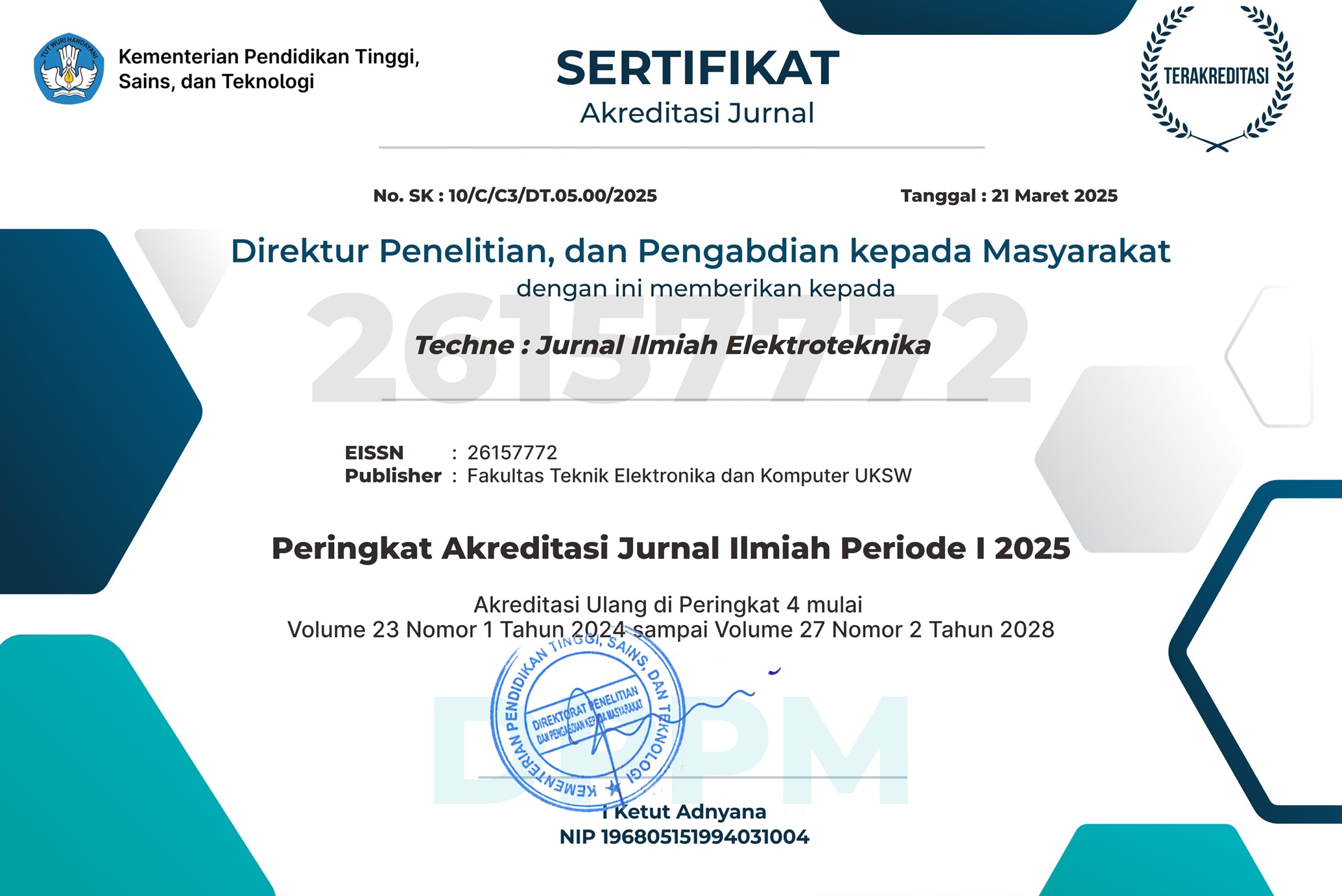The Performance of Machine Learning Model Bernoulli Naïve Bayes, Support Vector Machine, and Logistic Regression on COVID-19 in Indonesia using Sentiment Analysis
DOI:
https://doi.org/10.31358/techne.v23i1.446Keywords:
COVID-19, Machine Learning, Bernoulli Naïve Bayes, Support Vector Machine, Logistic Regression, Sentiment AnalysisAbstract
The COVID-19 pandemic has significantly impacted Indonesia, necessitating a deeper understanding of public sentiment towards the crisis. This study investigates the performance of three prominent machine learning models: Bernoulli Naïve Bayes, Support Vector Machine (SVM), and Logistic Regression, in analyzing sentiments related to COVID-19 in Indonesia. Utilizing a dataset comprising social media posts, the research aims to classify sentiments into positive, and negative categories, providing insights into the public's perception of the pandemic and associated measures. Sentiment analysis serves as a powerful tool to capture the collective emotions and opinions of the populace, which are pivotal in shaping public health responses and policies. The accuracy of LR and SVM is 99%, whereas Bayesian has an accuracy of 98%. We conclude that Logistic Regression and Support Vector Machine are the best model for the above dataset. This research evaluates these models' accuracy and reliability in the context of the Indonesian language, which influence sentiment interpretation. The findings of this study will contribute to the fields of natural language processing and public health by highlighting the efficacy of machine learning models in sentiment analysis during a health crisis. Moreover, the results will assist policymakers and health officials in understanding public sentiment, enabling them to tailor communication and interventions more effectively.
Downloads
References
S. H. Sahir, R. S. A. Ramadhana, M. F. R. Marpaung, S. R. Munthe, and R. Watrianthos, “Online learning sentiment analysis during the covid-19 Indonesia pandemic using twitter data,” in IOP Conference Series: Materials Science and Engineering, 2021, vol. 1156, no. 1, p. 12011.
M. Rahardi, A. Aminuddin, F. F. Abdulloh, and R. A. Nugroho, “Sentiment Analysis of Covid-19 Vaccination using Support Vector Machine in Indonesia,” Int. J. Adv. Comput. Sci. Appl., vol. 13, no. 6, 2022.
D. A. Nurdeni, I. Budi, and A. B. Santoso, “Sentiment analysis on Covid19 vaccines in Indonesia: from the perspective of Sinovac and Pfizer,” in 2021 3rd East Indonesia conference on computer and information technology (EIConCIT), 2021, pp. 122–127.
B. Sujiwo, A. Wibowo, and D. R. S. Saputro, “Sentiment Analysis of Indonesian Government Policies In Handling Covid 19 Through Twitter Data,” in 2021 4th International Seminar on Research of Information Technology and Intelligent Systems (ISRITI), 2021, pp. 453–457.
I. C. Sari and Y. Ruldeviyani, “Sentiment analysis of the covid-19 virus infection in indonesian public transportation on twitter data: A case study of commuter line passengers,” in 2020 International Workshop on Big Data and Information Security (IWBIS), 2020, pp. 23–28.
V. A. Fitri, R. Andreswari, and M. A. Hasibuan, “Sentiment analysis of social media Twitter with case of Anti-LGBT campaign in Indonesia using Naïve Bayes, decision tree, and random forest algorithm,” Procedia Comput. Sci., vol. 161, pp. 765–772, 2019.
F. Fazrin, O. N. Pratiwi, and R. Andreswari, “Comparison of K-Nearest Neighbor and Logistic Regression Algorithms on Sentiment Analysis of Covid-19 Vaccination on Twitter with Vader And Textblob Labeling,” in 2022 International Conference of Science and Information Technology in Smart Administration (ICSINTESA), 2022, pp. 39–44.
B. Sangeetha, S. Sangeetha, and D. T. Goutham, “Sentiment Analysis on Movie Reviews: A Comparative Analysis,” in 2023 International Conference on Intelligent Systems for Communication, IoT and Security (ICISCoIS), 2023, pp. 218–223.
F. I. Maulana, P. D. P. Adi, D. Lestari, A. Purnomo, and S. Y. Prihatin, “Twitter Data Sentiment Analysis of COVID-19 Vaccination using Machine Learning,” in 2022 5th International Seminar on Research of Information Technology and Intelligent Systems (ISRITI), 2022, pp. 582–587.
M. Qorib, T. Oladunni, M. Denis, E. Ososanya, and P. Cotae, “Covid-19 vaccine hesitancy: Text mining, sentiment analysis and machine learning on COVID-19 vaccination Twitter dataset,” Expert Syst. Appl., vol. 212, p. 118715, 2023.
P. Monika, C. Kulkarni, N. H. Kumar, S. Shruthi, and V. Vani, “Machine learning approaches for sentiment analysis: A survey,” Int. J. Health Sci. (Qassim)., vol. 6, no. S4, pp. 1286–1300, 2022.
F. I. Maulana, Y. Heryadi, W. Suparta, and Y. Arifin, “Social Media Analysis using Sentiment Analysis on COVID-19 from Twitter,” in 2022 6th International Conference on Information Technology, Information Systems and Electrical Engineering (ICITISEE), 2022, pp. 286–290.
T. Nasukawa and J. Yi, “Sentiment analysis: Capturing favorability using natural language processing,” in Proceedings of the 2nd international conference on Knowledge capture, 2003, pp. 70–77.
B. Liu and L. Zhang, “A survey of opinion mining and sentiment analysis,” in Mining text data, Springer, 2012, pp. 415–463.
C. Chew and G. Eysenbach, “Pandemics in the age of Twitter: content analysis of Tweets during the 2009 H1N1 outbreak,” PLoS One, vol. 5, no. 11, p. e14118, 2010.
F. P. E. Putra, F. I. Maulana, N. M. Akbar, and W. Febriantoro, “Twitter sentiment analysis about economic recession in indonesia,” Bull. Soc. Informatics Theory Appl., vol. 7, no. 1, pp. 1–7, 2023.
Downloads
Published
How to Cite
Issue
Section
License
Copyright (c) 2024 Wahyu Dirgantara, Fairuz Iqbal Maulana; Subairi, Rahman Arifuddin

This work is licensed under a Creative Commons Attribution-NonCommercial-ShareAlike 4.0 International License.








